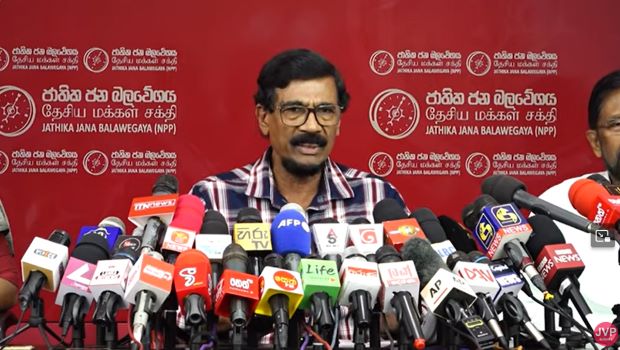Sri Lanka new administration will enact new constitution with referendum says Tilvin
COLOMBO – Sri Lanka’s new administration will carry out pledges in the National People’s Power (NPP) manifesto including the enactment of a new constitution, General Secretary of the Janatha Vimukthi Peramuna (JVP) Tilvin Silva said on Friday (15).
Addressing a media briefing at the party headquarters, he said the NPP manifesto put forward before the presidential elections, had pledged a new constitution, strengthening democracy within it, giving rights to various sections of the citizenry and abolishing the executive presidency.
“We are ready. Not only will we present the new constitution to the parliament, it will be put forward to the people through a referendum” Silva said acknowledging that it was a big task, but the party was committed to implementing the manifesto.
Silva was responding to a question from a reporter about whether the new administration would lose its enthusiasm to abolish the executive presidency after the elections.
He also assured the NPP will be careful about how the two-thirds majority will be used, given past experience.
Constitutions were enacted in Europe with two main objectives – to restrain the power of a state (constitutional restraint) over the people and to limit the power of majorities by giving absolute guarantees of equality.
However, critics say the opposite happened in Sri Lanka with the 1978 Constitution in particular, which increased the arbitrary powers of the President and the state machinery.
In the 1972 and 1978 Constitutions, the institution of permanent secretaries was also broken, expanding the arbitrary powers of the ministers who could now micro-manage ministries, departments and agencies instead of developing policy through an evidenced-based mechanism involving white papers and public consultation.
The British set up permanent secretaries by borrowing the Mandarin system (scholar-bureaucrats) from China.
The UK itself however does not have a constitutional restraint on the parliament (it is the only modern assembly with full parliamentary sovereignty) but operates on liberal principles, strong traditions which were developed particularly by the 19th century classical philosophers.
-economynext.com



Comments are closed, but trackbacks and pingbacks are open.